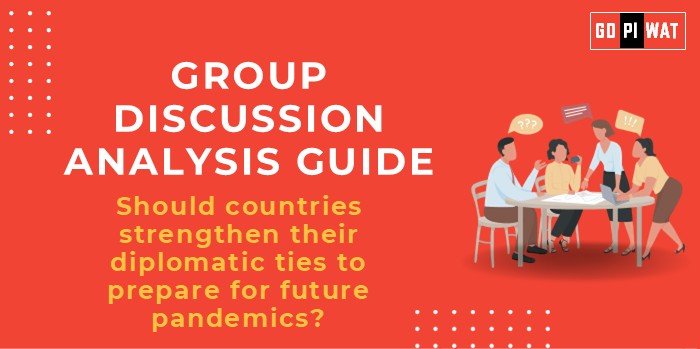📋 Group Discussion (GD) Analysis Guide: Should Countries Strengthen Their Diplomatic Ties to Prepare for Future Pandemics?
🌐 Introduction
📖 Opening Context
Global pandemics like COVID-19 have underscored the interconnectedness of nations and the critical role of international collaboration in addressing health crises. Strengthening diplomatic ties ensures a unified global response, sharing resources, and preventing future outbreaks.
📜 Topic Background
Historical precedents like the 2003 SARS outbreak highlighted the benefits of multilateral cooperation. Recent challenges, such as vaccine nationalism during COVID-19, revealed gaps in international health governance and solidarity. Strengthening diplomacy can address these gaps through structured agreements and proactive strategies.
📊 Quick Facts and Key Statistics
- 💰 Global Economic Impact of COVID-19: $12.5 trillion loss in GDP (IMF, 2023) — highlights the need for preventative measures.
- 💉 Vaccination Inequality: Only 27% of low-income countries achieved 70% coverage by 2023 (WHO).
- 🌍 Global Pandemic Fund: $1.6 billion raised for preparedness in 2023 (World Bank).
- 🩺 Public Health Spending: Only 3.5% of global GDP allocated to health systems (OECD).
🤝 Stakeholders and Their Roles
- 🏛️ World Health Organization (WHO): Coordinates global health strategies and guidelines.
- 🌐 National Governments: Implement policies and allocate resources for health infrastructure.
- 💡 Private Sector: Innovates vaccines, diagnostic tools, and treatments.
- 📢 Civil Society: Advocates for equitable access and monitors implementation.
🏆 Achievements and Challenges
✨ Achievements
- 🤝 COVAX Initiative: Delivered over 2 billion vaccine doses globally (2023).
- 🔬 Cross-Border Research: Countries like the US and Germany collaborated on mRNA vaccine development.
- 🌍 Global Surveillance Networks: Improved disease monitoring systems (e.g., GISAID).
⚠️ Challenges
- 💉 Vaccine Nationalism: Unequal distribution of vaccines created ethical and practical issues.
- 🏥 Weak Health Systems: Limited capacities in low-income nations exacerbate health crises.
- 🛡️ Global Fragmentation: Geopolitical tensions impede collective decision-making.
📚 Case Studies and Global Comparisons
- ✨ South Korea: Exemplified strong pandemic preparedness with minimal economic disruption.
- 🤝 West Africa (Ebola): Regional collaboration during the 2014–2016 outbreak demonstrated the value of joint responses.
- 🌍 India’s Role: Vaccine production (Covishield) and challenges balancing domestic needs with international commitments.
💡 Structured Arguments for Discussion
- ✅ Supporting Stance: “Strengthened diplomatic ties facilitate shared resources, synchronized responses, and equitable vaccine access.”
- 🛑 Opposing Stance: “Diplomacy often succumbs to geopolitical rivalry, delaying critical decisions during crises.”
- ⚖️ Balanced Perspective: “While diplomacy is essential, complementary strategies like local capacity building are equally critical.”
🎯 Effective Discussion Approaches
- 📊 Data-Driven: “Global pandemics cost $12.5 trillion; proactive diplomacy can significantly mitigate such losses.”
- 📚 Historical Reference: “The success of COVAX proves that international collaboration is crucial during health crises.”
⚙️ Counter-Argument Handling
- 🌐 Geopolitical Tensions: Highlight successful temporary alliances like the G7 Global Health Summit.
- 💰 Cost Concerns: Emphasize long-term savings from pandemic prevention.
🧠 Strategic Analysis of Strengths and Weaknesses
- 💪 Strengths: Established global health bodies (WHO), advancements in communication technologies.
- 🛠️ Weaknesses: Reliance on voluntary funding, geopolitical conflicts.
- 🌟 Opportunities: Building regional health hubs, leveraging AI for disease forecasting.
- ⚠️ Threats: Emerging infectious diseases, vaccine misinformation campaigns.
🏫 Connecting with B-School Applications
📚 Real-World Applications
- 🌍 Examining cross-border health financing models.
- 💼 Strategizing supply chain resilience for medical resources.
🎓 Sample Interview Questions
- ❓ “How can diplomacy address vaccine inequality?”
- ❓ “What role should private companies play in global health governance?”
📘 Insights for B-School Students
- 💡 Understand global health economics.
- ⚙️ Explore roles in public-private partnerships.


